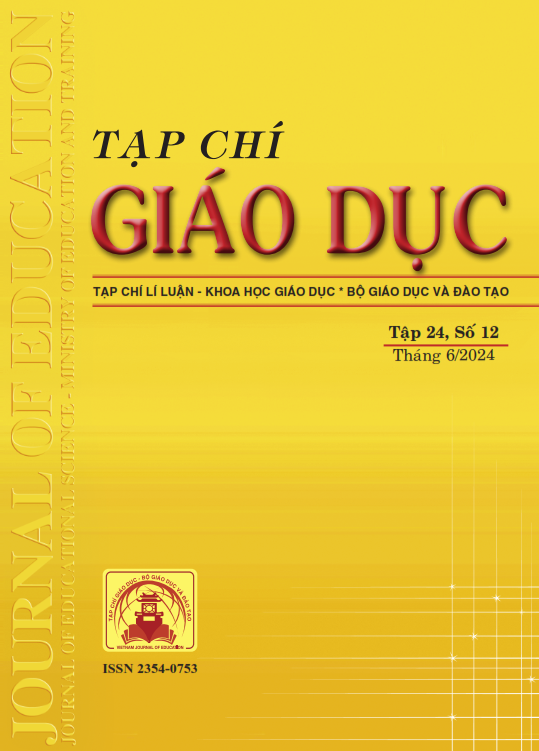Kiểm tra, đánh giá kiến thức từ vựng của sinh viên đại học với danh sách từ vựng tiếng Anh thông dụng mới
Tóm tắt
Vocabulary knowledge assessment plays a critical role in language teaching and learning. A number of studies have been conducted to evaluate the vocabulary knowledge of the Vietnamese EFL learners at different educational levels. This study was conducted with 290 first-year non-English majors at a university. The students took a bilingual test to assess their vocabulary knowledge with the New General Service List (NGSL). The result showed that the students participating in the study had a limited vocabulary. Only 37% of all participants recognized the meaning of 2,500 words in the list. Moreover, the participants demonstrated better knowledge of more common words. The study is expected to make positive contributions to the vocabulary knowledge assessment practices, thereby improving the quality of language education in Vietnam.
Tài liệu tham khảo
Browne, C. (2013). The new general service list: Celebrating 60 years of vocabulary learning. The Language Teacher, 37(4), 13-16.
Bui, T. K. P., Nguyen, Q. T., & Le, T. H. (2022). The development of A Vietnamese-English Bilingual Version of the New General Service List Test. 2nd Hanoi Forum on Pedagogical and Educational Sciences, Hanoi, Vietnam. Gyllstad, H. (2019). Measuring knowledge of multiword items. In The Routledge handbook of vocabulary studies (pp. 387-405). Routledge.
Nation, I. S. P. (2012). The BNC/COCA word family lists. http://www.victoria.ac.nz/lals/about/staff/paulnation Nation, I. S. P. (2013). Learning vocabulary in another language. Cambridge University.
Nation, I. S. P., & Beglar, D. (2007). A vocabulary size test. The Language Teacher, 31(7), 9-13.
Nguyen, L. T. C., & Nation, P. (2011). A bilingual vocabulary size test of English for Vietnamese learners. RELC Journal, 42(1), 86-99. Nguyen, T. M. H., & Webb, S. (2017). Examining second language receptive knowledge of collocation and factors that affect learning. Language Teaching Research, 21(3), 298-320. https://doi.org/10.1177/1362168816639619 Read, J. (2019). Key issues in measuring vocabulary knowledge. In The Routledge handbook of vocabulary studies (pp. 545-560). Routledge. Schmitt, N., Cobb, T., Horst, M., & Schmitt, D. (2017). How much vocabulary is needed to use English? Replication of van Zeeland & Schmitt (2012), Nation (2006) and Cobb (2007). Language Teaching, 50(2), 212-226. https://doi.org/10.1017/s0261444815000075 Schmitt, N., Schmitt, D., & Clapham, C. (2001). Developing and exploring the behaviour of two new versions of the Vocabulary Levels Test. Language Testing, 18(1), 55-88. Stoeckel, T., & Bennett, P. (2015). A test of the new General Service List. Vocabulary Learning and Instruction, 4(1), 1-8. https://doi.org/10.7820/vli.v04.1.stoeckel.bennett Stoeckel, T., Ishii, T., & Bennett, P. (2018). A Japanese-English bilingual version of the new general service list test. JALT Journal, 40(1), 5-21. https://doi.org/10.37546/JALTJJ40.1-1 Vu, D. V., & Nguyen, N. C. (2019). An assessment of vocabulary knowledge of Vietnamese EFL learners. The 20th English in Southeast Asia Conference, National Institute of Education, Nanyang Technological University, Singapore. Vu, D. V., & Peters, E. (2021). Vocabulary in English language learning, teaching, and testing in Vietnam: A review. Education Sciences, 11(9), 563. https://doi.org/10.3390/educsci11090563
Webb, S. A., & Chang, A. C. S. (2012). Second language vocabulary growth. RELC Journal, 43(1), 113-126. https://doi.org/10.1177/0033688212439367
Webb, S., & Nation, I. S. P. (2017). How vocabulary is learned. Oxford University Press.
Yanagisawa, A., & Webb, S. (2019). Measuring depth of vocabulary knowledge. In The Routledge handbook of vocabulary studies (pp. 371-386). Routledge.
Tải xuống
Đã Xuất bản
Cách trích dẫn
Số
Chuyên mục
Giấy phép

Tác phẩm này được cấp phép theo Ghi nhận tác giả của Creative Commons Giấy phép quốc tế 4.0 .












